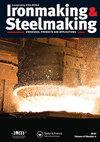利用声发射监测优化高炉端铸工艺
IF 2.2
3区 材料科学
Q2 METALLURGY & METALLURGICAL ENGINEERING
引用次数: 0
摘要
在高炉出钢时,为了保持出钢口的健康状态和防止气体和粉尘逸出到环境中,需要防止气体通过铸件末端的出钢口突破。在本文中,提出了两种声学技术,可以用来防止气体排放的口在铸件的末端。第一种方法是通过对记录数据进行频谱分析,第二种方法是使用神经网络来识别表明渣气界面接近出水口水平的爆裂声。结果发现,两种方法都能在注射结束前4-2分钟检测到注射结束。本文章由计算机程序翻译,如有差异,请以英文原文为准。
Acoustic emission monitoring to optimize the end-of-cast in blast furnaces
ABSTRACT
When tapping a blast furnace, a break-through of gas through the taphole at the end of a cast needs to be prevented, both to preserve a healthy state of the taphole and to prevent gas and dust from escaping into the environment. In this paper, two acoustic techniques are presented that can be used to prevent gas emissions from the taphole at the end of a cast. The first approach is by using the spectral analysis of the recorded data, the second approach uses a neural network to recognize the popping sounds that announce the slag–gas interface is approaching the taphole level. It was found that with both methods the end of the cast is detected about 4–2 min before the cast is ended.
求助全文
通过发布文献求助,成功后即可免费获取论文全文。
去求助
来源期刊

Ironmaking & Steelmaking
工程技术-冶金工程
CiteScore
3.70
自引率
9.50%
发文量
125
审稿时长
2.9 months
期刊介绍:
Ironmaking & Steelmaking: Processes, Products and Applications monitors international technological advances in the industry with a strong element of engineering and product related material. First class refereed papers from the international iron and steel community cover all stages of the process, from ironmaking and its attendant technologies, through casting and steelmaking, to rolling, forming and delivery of the product, including monitoring, quality assurance and environmental issues. The journal also carries research profiles, features on technological and industry developments and expert reviews on major conferences.
 求助内容:
求助内容: 应助结果提醒方式:
应助结果提醒方式:


